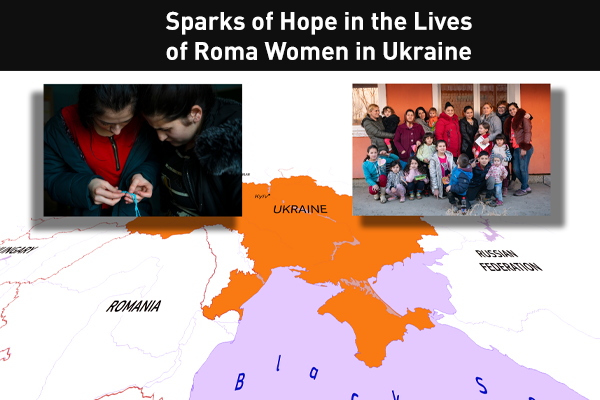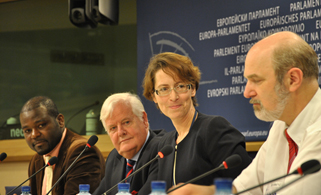By Kirsi Hekkala
Twenty women and girls huddle together into a small Roma church in a Hungarian speaking village in Western Ukraine. Little babies nestle in the arms of teenage mothers, while grandmothers look after older ones. For a moment you might think you have come to a jungle, since the noise can be quite disturbing. But little by little voices quieten and everyone finds their place. The boys go outside. Men are not allowed. Today is the most important day of the week for the women. For a couple of hours, they are heard and understood. – The women’s group is gathering in the village of Kholmok.
A few years ago, I read the Epistle to Titus from the Bible. Here the apostle Paul writes that older women should teach younger women. I understood that God was speaking to me about how women should rise up in Roma society to care for each other. They are usually uneducated, illiterate and in many ways unprepared to raise a family. Mothers can be as young as fourteen or fifteen and are often used and abused by men. In this village, this means that the men often have a second family on the side. It is heartbreaking to see how the women have no strength to protect themselves and their children. Again and again they fall into the same trap – to be abused again. But God has a plan for everyone’s’ life. If He is allowed to give hope and purpose to their lives, it will impact not just one woman’s life, but a whole family, even a village.
The group starts with each participant telling something good that has happened in her life in the past week. This was quite a challenge at first, as many women did not find anything good in their lives. Last week I asked Morika, a mother of eight, the same question. She thought for a while and then said that she was thankful to be alive. Her husband had gambled away their shack and now the family was looking for a shelter.
When we first started the women’s group three years ago, only six women who attended church regularly came. With their eyes downcast, they sat quietly, just like in church. I remember the first time we did handicrafts. 40-year-old Zolika, a mother and grandmother, was gluing pictures of flowers around a Bible verse. Her sons clung to her begging to help. But this mother, who could have been a poster girl for a beggar, raised her eyes and sternly replied to her boys, “No. Today is my day!” Probably for the first time in her life she put herself first before her family. This was the beginning of a new life to her.
We talk about families, women, about God. Women practice reading, sewing, making beautiful crafts. Little by little they grasp the idea that they are precious images of God. They understand that they have abilities and are capable of learning more. All these mothers and girls have started attending Sunday church services also.
Crocheting revolution
Just before the Covid lockdown last year, we started a sewing circle for women in the mountain village of Pasika. These were country people: hard working but living in extreme poverty. The women started to crochet. They clung to every word of encouragement they heard and with every new stitch they learned they began to make beautiful things. It was almost impossible to believe how fast they learned. These women’s talents had been waiting a long time to be revealed.
Marina participated in the women’s sewing circle from the start. She provides for her invalid husband by begging and selling whatever she can find. When she had learned the first principles of crocheting, she went home and made a bag, beautiful, with many colors. She brought it to the gathering and showed it to everyone. This started a small revolution. More women wanted to learn. The group grew from ten to about fourty women and girls. Even some husbands were caught practicing crochet at home behind closed doors.
Marina loves knitting. By now she is able to earn some money by selling some of her handicrafts.
God loves families as a whole. Women are often forgotten in Roma culture, but they are the key to family’s wellbeing. The men work outside, but the home belongs to the women. Everywhere they go, a line of children follows them. Helping mothers is also a ministry to the children.
The best way to reach women is to find out their interests and desires. By listening and learning, I believe we will learn how to work in each village. The challenges are huge, but we are sure that God is working in their lives.
Now we are going to a third village. Pastor Ruslan from Seredne Roma Church had heard how God is working in Kholmok, and he invited us there.
Kirsi and her husband Veikko are missionaries from Finland. They work among the Roma in Western Ukraine with Fida Int.












